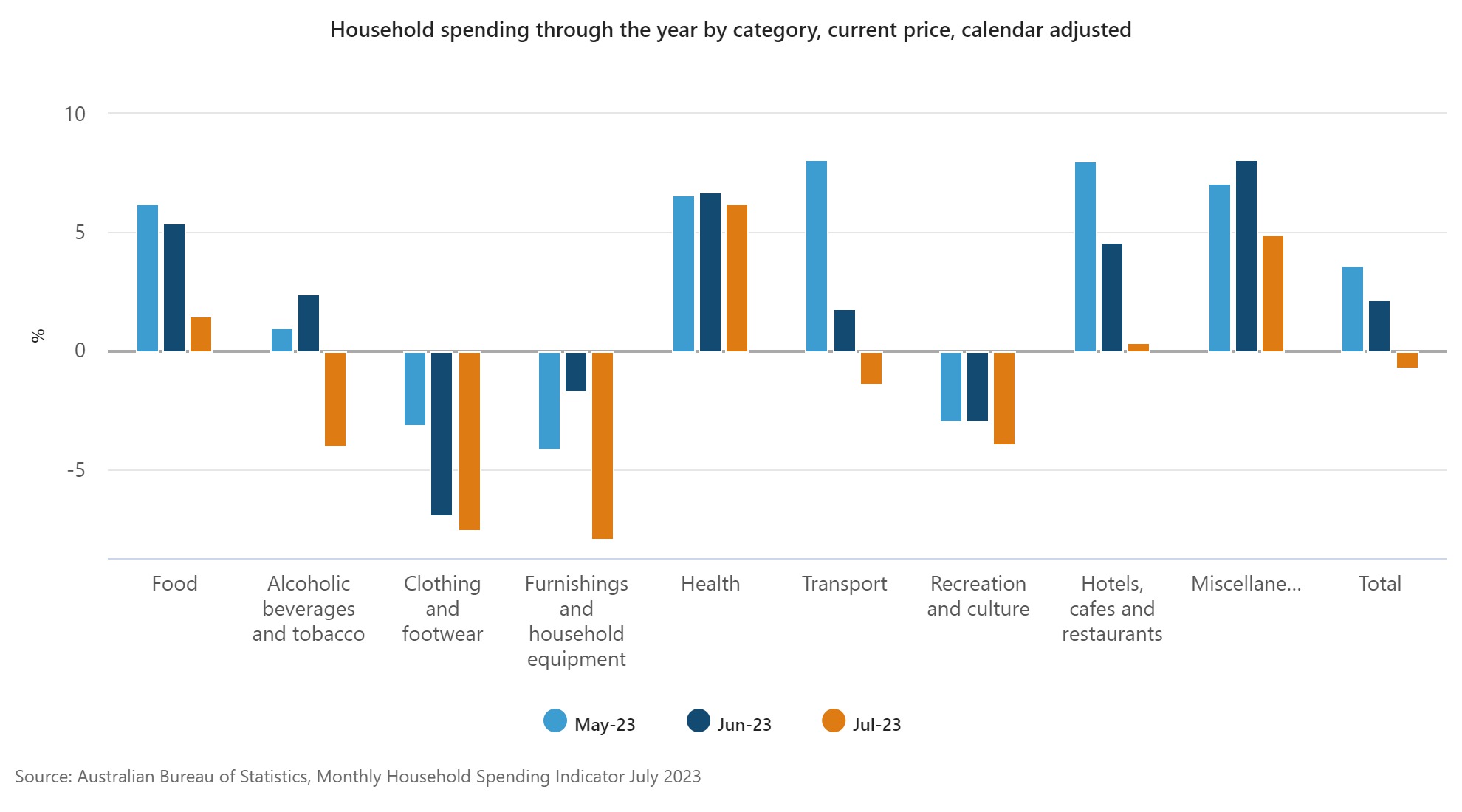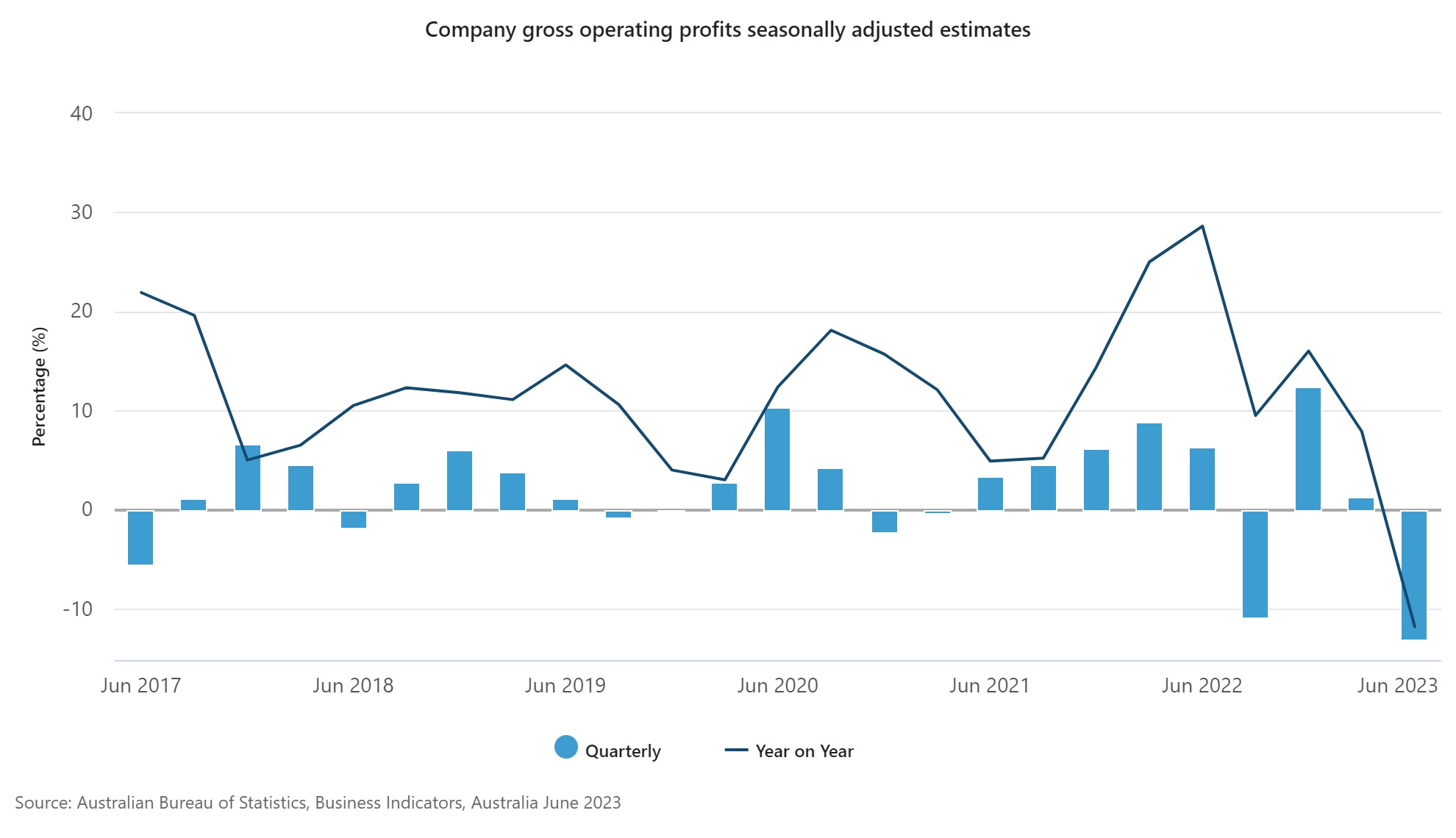5 things you need to know about consumption, profits and what that means for investing
In the hundreds of days, hours and minutes we’ve spent talking about a forthcoming recession, there’s been a few data points economists have been watching for. These include a slowdown in consumer spending, deceleration in inflation and a hit to company profits. But are they coming?
The Australian Bureau of Statistics released its quarterly estimates of private sector sales, wages, profits and inventories and monthly household spending indicator. Here are the key things you need to know and what that means for investing.
1. Household spending has fallen by 0.7% since July last year
This is the first time it’s fallen since February 2021 – that is, when we were still in the heights of dealing with the COVID pandemic. Spending on discretionary goods and services was also down for the fourth straight month. This is important because it suggests the cost of living might be seeing consumers pull in the purse strings. Non-discretionary spending – aka groceries and essential goods and services – rose but at a very low rate.
The biggest falls in spending were for clothing and footwear, furnishings and household equipment and alcoholic beverages and tobacco. This is one of many measures that the RBA monitor to see if its rates policy is having an effect on behaviour and the economy – that is, they’ll be pleased to see it drop off.

2. Company profits fell 13.1% in the second quarter of 2023, while wages and salaries rose 1.8%.
The biggest falls were seen in accommodation and food services (-23.6%), mining (-21.3%) and rental hiring and real estate services (-11.8%). The biggest gains were seen in Administrative and support services (25.7%) and Financial and insurance services (15.7%).

3. Inflation is starting to fall, but is it fast enough?
The monthly CPI indicator from the ABS rose 4.9% in the 12 months to July. This was less than expected.
The RBA have projected inflation to reach around 4.1% in the final quarter of 2023 and are forecasting a return to its targeting inflation band of 2-3% by 2025.
4. Falling company profits could spell good news for inflation, even as wages rise
Analysis by the Organisation for Economic Cooperation and Development released in June found that persistent inflation – aka the reason for our increasingly expensive grocery shops and the misery of rate hikes from the RBA – was being driven by company profits more so than high wages. It’s hardly a stretch to suggest therefore that falling profits could correspond to falls in inflation numbers.
5. The data suggests we’re getting close to the end of rate hikes
The consensus varies with some commentators still expecting one more hike to bring the cash rate to 4.35% by the end of 2023, while others think we’re done. Either way, the data shows what the RBA has been wanting to see – slowing consumption, a hit to company profits and a decrease in inflation numbers.
What this all means from an investment perspective?
- Equities: we’re moving into a tougher environment for companies. Those sectors which are likely to do best in a period of slower consumption are those focused on essentials, such as consumer staples, healthcare and energy. Macquarie noted this in its August reporting season wrap, saying "the rising cost of living and the impact of higher mortgage rates have weighed on consumer spending, which slowed in the second half of FY23. Cyclical retail companies often reported negative comparable sales growth for their early FY24 trading updates, suggesting spending will remain under pressure."
- Bonds and credit markets: bonds are usually popular in tough times ergo prices rise, but you’ll see some falls in yields. If we see another rate rise to the end of 2023, we should see a corresponding rise in yields too which would extend the bond market's slump even further.
- Private markets: generally speaking, tougher economic conditions can actually be good news for private markets. For example, less liquidity in the markets means those private lenders able to offer finance are able to command higher premiums in return for their capital.
- Property: tougher times and lower liquidity mean it is harder to get a mortgage – while in theory, this could have an impact on residential property and mortgage defaults, we still have a property shortage, along with increasing immigration into Australia. In terms of the other sides of property though, it’s not necessarily the same story. There has already been drop off in discretionary spend and the retail sector is suffering, this in turn could translate to increased vacancies in retail property. In commercial property for example, the labour market remains relatively strong but there continues to be challenges around getting people back into the office – this has implications for how companies use office spaces and the sizes of spaces they need.
- Commodities: Precious metals, like gold, tend to appreciate in value in tough times. However it could be a different story for other commodities like iron ore depending on what is happening economically for trade partners like China.
- Cash and currencies: Cash investments are offering reasonable returns courtesy of higher interest rates at present. Generally speaking, tough times might signal rate cuts but investors should be wary of thinking this way. After all, the current rates represent somewhat of a normalisation rather than highs and central banks will be hesitant to return to the extreme lows of the recent past. In terms of currencies, the Australian dollar will vary depending on other economies. It is likely to continue to trade at a discount to currencies like the US dollar.
4 topics

